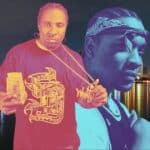The 1980s was an era that brought us many groundbreaking developments in music, particularly when it comes to hip-hop. The birth of a fresh and innovative genre, 80s hip hop, introduced a new wave of artists who left an indelible mark on rap and beyond, paving the way for the diverse talent we see in the industry today.
As we travel down memory lane to explore the top 10 best 80s rappers, we must not forget that the decade was a period of experimentation and growth for the rap scene. Although the music may not be as polished as modern hits, the raw energy and powerful lyrical content present in these earlier productions significantly impacted listeners. They created a lasting influence on the genre as a whole.
This list of best 80s rappers includes names like Salt-N-Pepa, Queen Latifah, Kool Moe Dee, Kurtis Blow, and Rakim. Each brought their unique style and contributed significantly to shaping the sound and direction of hip hop as we know it. Without these pioneering artists, the landscape of rap music would look profoundly different today.
Rap Music in the 80s
Rise of Hip-Hop
In the early 1980s, rap music emerged as a new subculture, transforming the landscape of the music industry. A blend of storytelling, poetry, and rhythm, rap became synonymous with the sounds of the urban youth. Street corners and local parks were the birthplaces of early hip-hop culture, with MCs and DJs joining forces to captivate audiences through beats and rhymes.
While hip-hop traces its roots back to the late 1970s, it was in the 1980s that rap music indeed took off. During this era, iconic artists like Run-D.M.C, LL Cool J, and Public Enemy brought rap to the forefront of the music scene. Rap music gained widespread airplay and charted on the Billboard Hot 100 thanks to the rise of record labels such as Def Jam. By the late 1980s, hip-hop had become dominant in the industry, with rap songs regularly topping the charts.
New York’s Influence
New York City, particularly the boroughs of the Bronx and Brooklyn, played a pivotal role in developing rap music during the 1980s. Early pioneers like Grandmaster Flash and the Sugarhill Gang laid the foundation for the genre, creating a blueprint for artists to follow.
As rap continued to evolve, new subgenres, such as gangsta rap and conscious rap emerged. This era also saw the rise of the dancehall sound in hip-hop, with artists like KRS-One and Boogie Down Productions blending reggae and rap to create a unique fusion.
New York City remained at the heart of the movement throughout this golden age of rap. Innovative artists from the city built upon the foundations of early hip-hop, pushing the genre to new heights and solidifying its status as a cultural phenomenon.
Iconic 80s Rappers
LL Cool J
LL Cool J, born James Todd Smith, is undoubtedly one of the best 80s rappers known for his powerful rap style and charisma. He released his debut album “Radio” in 1985, which received immense critical acclaim and commercial success. The album features hit tracks like “I Need a Beat” and “Rock the Bells,” which helped solidify his position in the hip-hop scene during the 1980s. LL Cool J continued to release successful albums throughout the decade, impacting the rap genre and influencing future artists.
Ice Cube
Ice Cube started his career in the 1980s as a member of the iconic hip-hop group N.W.A, alongside Dr. Dre, Eazy-E, MC Ren, and DJ Yella. He was a crucial contributor to the group’s groundbreaking 1988 album “Straight Outta Compton,” which introduced gangsta rap to the mainstream and showcased Ice Cube’s powerful lyricism and storytelling abilities. After leaving N.W.A, Ice Cube released his debut solo album “AmeriKKKa’s Most Wanted” in 1990, continuing his influential role in the rap scene and solidifying his position as one of the best 80s rappers.
Rakim
Considered one of the most influential MCs of all time, Rakim revolutionized the rap genre with his complex lyricism and unique delivery. He rose to prominence in the 1980s as a hip-hop duo Eric B. & Rakim member, releasing their debut album “Paid in Full” in 1987. The album features tracks like “I Ain’t No Joke” and “My Melody,” which showcased Rakim’s innovative rap style and redefined the standards for future artists. Rakim’s impact on the 1980s rap scene is undeniable, making him a critical figure in the genre’s development.
N.W.A
N.W.A, or N***az Wit Attitudes, was a pioneering gangsta rap group 1980s consisting of Ice Cube, Dr. Dre, Eazy-E, MC Ren, and DJ Yella. They released their debut album “Straight Outta Compton” in 1988, which shattered barriers with provocative lyrics and powerful depictions of life in urban Los Angeles. N.W.A’s members had successful solo careers, further solidifying their positions as leading rappers in the 1980s.
Big Daddy Kane
Big Daddy Kane, born Antonio Hardy, is another influential 80s rapper known for his smooth flow and distinctive wordplay. He released his debut album “Long Live the Kane” in 1988, featuring popular tracks like “Ain’t No Half-Steppin'” and “Raw.” Kane’s confident stage presence and lyrical prowess helped redefine hip-hop during this era. As a member of the Juice Crew, he contributed to the collective’s success in the 1980s and left a lasting impact on the rap genre.
Pioneering Groups and Collaborations
Run DMC and Aerosmith
Run DMC was a groundbreaking hip-hop group from the 1980s based in the Bronx. They collaborated with Aerosmith, a rock band, to create the iconic song “Walk This Way”. This fusion of rap and rock allowed Run DMC to gain even more popularity. The group, consisting of Joseph “Run” Simmons, Darryl “D.M.C.” McDaniels, and Jason “Jam Master Jay” Mizell, is also known for their partnership with Adidas, being the first rap group to receive a sponsorship from the international clothing brand.
Public Enemy
Public Enemy is another influential 80s hip-hop group known for their politically charged lyrics and powerful beats. Comprised of Chuck D, Flavor Flav, Terminator X, and Professor Griff, among others, the group was at the forefront of the development of gangsta rap. One of their most famous songs, “Fight the Power,” served as an anthem for social justice and highlighted the power of hip-hop as a platform for change. Public Enemy helped pave the way for artists like Eazy-E and groups like N.W.A.
Beastie Boys
The Beastie Boys were a trio of rappers from New York City, known for their unique blend of punk rock and hip-hop. The group, consisting of Adam “MCA” Yauch, Adam “Ad-Rock” Horovitz, and Michael “Mike D” Diamond, made a huge impact on the hip-hop scene in the 1980s. Their debut album, “Licensed to Ill,” was the first rap album to top the Billboard charts. With their innovative style and energetic performances, the Beastie Boys inspired future rap and rock artists.
Throughout the 80s, these pioneering groups and their collaborations with other artists contributed to hip-hop music’s growing popularity and influence. Their unique styles, bold statements, and innovative approaches helped to shape the genre we know and love today.
Female 80s Rappers
The 80s brought the emergence of talented female rappers who made significant contributions to the hip-hop scene. Some of the most prominent female rappers of the decade include Salt-N-Pepa, MC Lyte, Queen Latifah, and Roxanne Shanté.
Salt-N-Pepa
Salt-N-Pepa consisted of Cheryl James (Salt), Sandra Denton (Pepa), and Deidra Roper (Spinderella). This groundbreaking trio was one of the first female rap groups, and their influence can still be heard in today’s hip-hop. They sold over 15 million albums and singles worldwide, and six of their singles have been certified either platinum or gold in the United States by the RIAA.
Some of Salt-N-Pepa’s standout tracks include “Push It,” “Shoop,” and “Let’s Talk About Sex,” which showcased their ability to create catchy hooks and address important social issues with their lyrics.
MC Lyte
MC Lyte was a trailblazer in the world of hip-hop. Her debut album, Lyte as a Rock, was released in 1988 and instantly gained her recognition as a formidable rapper. With hit singles like “Paper Thin” and “Lyte as a Rock,” MC Lyte solidified her status as a skilled lyricist who could match her male counterparts.
MC Lyte’s style stands out for her witty wordplay, quick delivery, and ability to touch on female empowerment and self-confidence themes.
Queen Latifah
Before becoming a renowned actress, Queen Latifah rose to fame in the late 80s as a female rapper. Her debut album, All Hail the Queen, released in 1989, featured tracks like “Ladies First” and “Wrath of My Madness,” highlighting her strong, assertive voice and feminist perspective.
Throughout her career, Queen Latifah has been a proponent of women’s rights and is often credited with helping to pave the way for future female rappers.
Roxanne Shanté
Roxanne Shanté emerged in the mid-80s as part of the Juice Crew collective. She demonstrated her lyrical prowess in tracks like “Roxanne’s Revenge,” a response to UT.
Innovations in Style and Technique
Flow and Lyrics
In the 1980s, rappers began experimenting with new styles of flow and lyricism that set them apart from their predecessors. The decade saw a shift from the simplistic rhymes of early hip-hop acts like the Sugarhill Gang to more intricate and thoughtful storytelling, often reflecting on social issues and personal experiences.
One prime example is Public Enemy, which used its music to address racial inequality, politics, and other societal issues. Similarly, Boogie Down Productions, led by KRS-One, delivered powerful messages on education and social commentary in their songs.
Regarding technique, rappers like Kool Moe Dee displayed rapid-fire delivery and intricate wordplay. At the same time, Rakim (from Eric B. & Rakim) introduced an unprecedented level of lyricism by using complex metaphors and internal rhymes showcased in hits like “Paid in Full.” Doug E. Fresh gained fame with his beatboxing skills, adding a unique element to the genre.
Hot Tracks
The 80s provided several exceptional tracks that showcased innovation in style and technique. Below are a few notable examples:
- Straight Outta Compton by N.W.A: This groundbreaking track by Ice Cube, Eazy-E, Dr. Dre, MC Ren, and DJ Yella introduced the world to gangsta rap with vivid storytelling about the reality of life in Compton, California. It also combined aggressive beats with powerful, politically charged lyrics.
- Paid in Full by Eric B. & Rakim: The single from their debut album showcased Rakim’s lyrical prowess, with innovative flow and wordplay that would influence future generations of rappers.
- Push It by Salt-N-Pepa: This song by the female hip-hop trio marked a significant step for women in the genre, as they combined catchy hooks, classic beats, and sexually confident lyrics to create a pop crossover hit.
- The Show / La Di Da Di by Doug E. Fresh & Slick Rick: These tracks solidified Doug E. Fresh as a beatboxing pioneer and gave the world a taste of Slick Rick’s impressive lyrical storytelling skills.
Impact on Pop Culture
Television and Movies
In the 1980s, rap music began to significantly impact pop culture, with artists such as Will Smith and Public Enemy making their mark on television and movies. Will Smith, then known as The Fresh Prince, gained fame as part of the hip hop duo DJ Jazzy Jeff & The Fresh Prince and later became a household name with his starring role in the successful TV show “The Fresh Prince of Bel-Air.”
Spike Lee’s iconic film “Do the Right Thing” featured Public Enemy’s popular track “Fight the Power”, which further solidified the group’s impact on pop culture. Rap groups like A Tribe Called Quest, Jungle Brothers, and EPMD contributed to movie soundtracks, enhancing their visibility and influence within the entertainment industry.
Grammy Awards
The 80s also saw rap artists being recognized at the Grammy Awards, highlighting the genre’s increasing influence and acceptance. In 1988, “Parents Just Don’t Understand” by DJ Jazzy Jeff & The Fresh Prince won the first-ever Grammy for Best Rap Performance. Melle Mel, a pioneer in hip-hop, was also acknowledged with a Grammy, raising the genre’s profile and drawing attention to its roots.
Commercial Success
During the 1980s, rap experienced substantial commercial success as artists like Too $hort, Dr. Dre, and Public Enemy released popular albums. Public Enemy’s groundbreaking album, “It Takes a Nation of Millions to Hold Us Back”, achieved critical acclaim and sales success, showcasing rap’s potential on a mainstream level.
MTV played a crucial role in furthering rap’s commercial success by featuring music videos from these artists, exposing the genre to a wider audience. As a result, 80s rappers helped to pave the way for the commercial and cultural dominance of the genre in subsequent decades, leaving a lasting impact on the music industry and pop culture.
Frequently Asked Questions
Who were the top male rappers?
During the 1980s, several male rappers made a significant impact in the hip-hop genre. Some of the most prominent names include Ice Cube, a founding member of N.W.A, who was instrumental in bringing gangsta rap to the mainstream. Other top rappers from the decade include Biz Markie, known for hits like “Goin’ Off” and “The Biz Never Sleeps,” and Kurtis Blow, the first hip-hop artist to achieve gold status in the United States with his self-titled debut album.
Who were the top female rappers?
In the 1980s, numerous talented female rappers emerged and contributed to the growth of hip-hop. Queen Latifah was a powerful force, taking the world by storm with her conscious lyrics and eloquent rap style. Salt-N-Pepa, a hip-hop trio formed in 1985, had their first hit with “Push It” in 1987, which was nominated for a Grammy Award. Both acts paved the way for future generations of female artists in the genre.
Who influenced 80s rap?
Many factors influenced 80s rap, including previously established genres such as funk, disco, and R&B. Early trailblazers in hip-hop like Grandmaster Flash, The Sugarhill Gang, and Afrika Bambaataa also laid the groundwork for the sound and style during the 1980s.
What defined 80s rap style?
The 1980s rap style was marked by the diverse lyrical content and unique beats that helped distinguish different sub-genres. From the politically charged lyrics of Public Enemy to the fun and lighthearted tunes of The Fat Boys, the 80s rap encompassed a wide range of styles. The decade was also characterized by an emphasis on breakdancing and colorful fashion, which became associated with the hip-hop culture.
How did 80s rap impact the 90s?
The creative achievements of rappers in the 1980s set the stage for the evolution and growth of hip-hop in the 1990s. The success of rap acts like Run-D.M.C., N.W.A, and LL Cool J in the 80s paved the way for the emergence of 90s rap icons such as Tupac Shakur, The Notorious B.I.G., and Nas. The innovative beats, lyrics, and cultural impact of 80s rap helped shape and define the genre for years.
Which New York rappers emerged in the 80s?
New York City has always been a hotbed for hip-hop talent, and the 1980s were no exception. Some notable rappers who emerged in the 80s include the trio Salt-N-Pepa, Big Daddy Kane, KRS-One, and Rakim. These artists and others helped solidify New York City’s reputation as a breeding ground for influential hip-hop acts.



